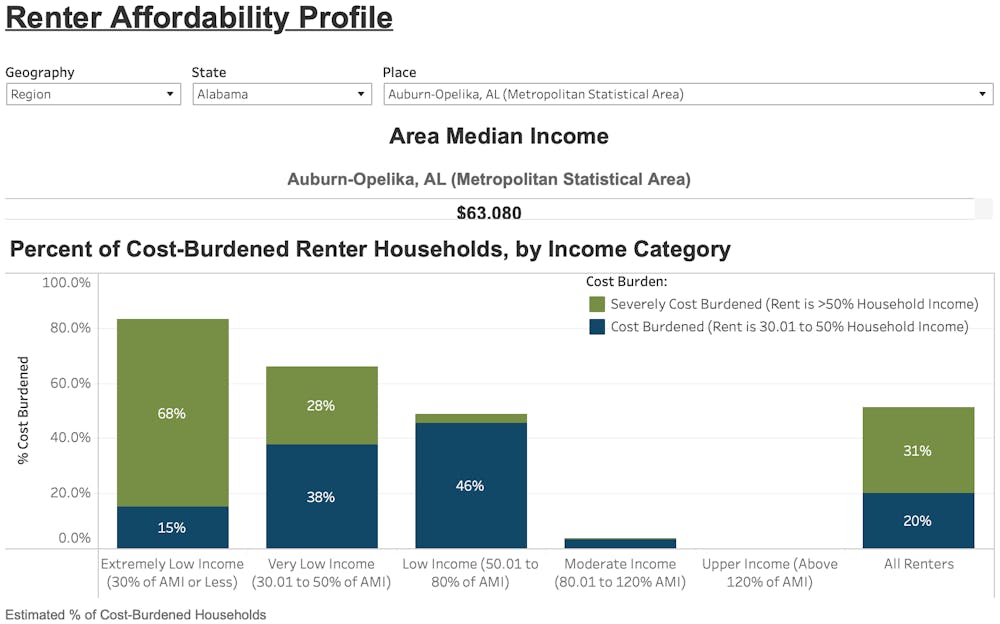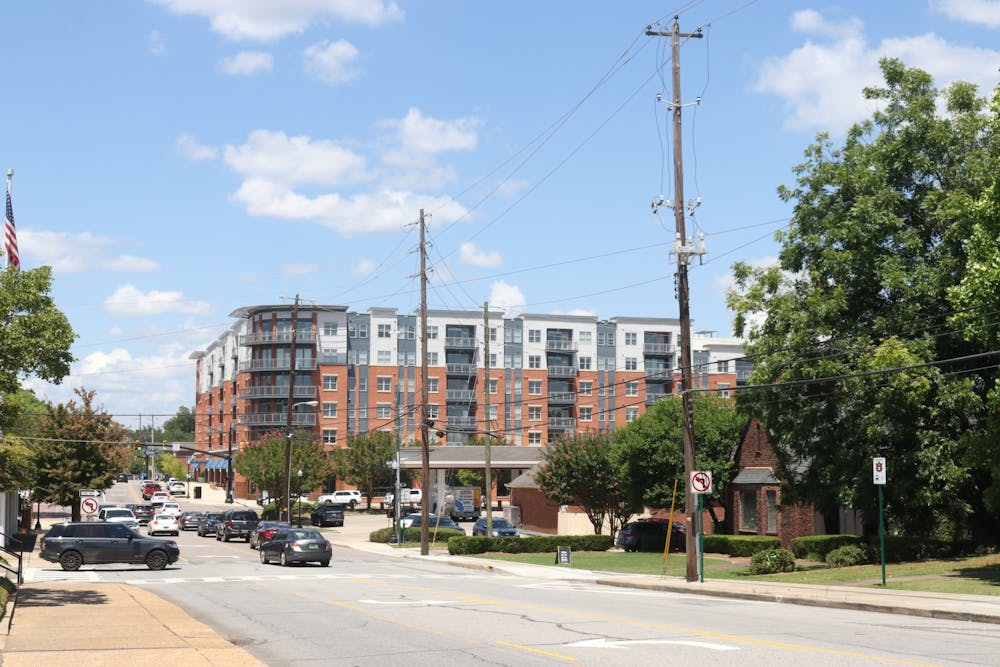This is in response to the Plainsman’s July column titled “Urbanization of Auburn leaving behind some community members.“ As a former resident, I write because I disagree that urbanization (or urbanism, as its advocates prefer) is a bogeyman that implies negatives like “gentrification” — to the contrary, urbanism and its principles offer a path to sustainability and inclusion, and I believe Auburn should embrace them.
Despite the lack of supporting evidence for the premise that residents or communities are being displaced from Auburn, I agree with the author’s suggestion that housing affordability has never been worse in Auburn. The graphics below support their assertion that while the wealthy are taken care of, the rest — including students — are left behind in housing markets at staggering rates.

This graphic from the Federal Reserve Bank of Atlanta's Southeastern Rental Affordability Tracker shows the share of the Auburn-Opelika area's population that pays a high amount of their income on rent. | Submitted by Patrick Reuther
A deficit of over 13,000 affordable homes is substantial, as over 30,000 students were enrolled for 2020-2021, about a 20% increase from my time at Auburn ten years ago.
Based on context clues, I would guess that the author and I are diametrically opposed when I say that the solution is simply to build housing until the deficit goes away — not because it’s common sense, or because it’s the right thing to do, but because of basic economics. If housing supply remains constant while population increases, prices will necessarily go up. I could draw a graph, but the fact stands: with fixed supply and increasing demand, prices rise.
It is worth stating directly: Inaction is inferior to building more housing for the population of Auburn. Without new homes, the scenario above is realized - people are priced out and must leave, as the author fears. This is reality in my home of Atlanta, a city defined by perpetual sprawl that local residents increasingly despise. I agree with the author that we should reverse this immediately in Auburn.
Critics of housing development believe that building new or market-rate housing only benefits the rich and won’t lower housing costs. However, anecdotal and empirical evidence suggest that building new housing even at market rates lowers price levels and makes existing housing more affordable. In fact, even new luxury housing construction has been found to lower prices, contrary to the perception of glass highrises as the emblem of gentrification. While there’s room for disagreement on how new development reduces existing housing costs, or what causes gentrification, it’s clear that the author’s suggestion that housing development causes gentrification is wrong.
Even so, urban communities are experiencing spiking “NIMBYism” in which entrenched homeowners reject development of new housing or inclusion of new residents, generally on grounds of preserving character or in direct fear of the consequences of increased housing density. Racism and segregation are also an undeniable component. I believe these fears are unfounded, and I believe Auburn can maintain its character and safety while promoting a welcoming and inclusive environment.
Urbanism is for Auburn
I will leave a full discussion of urbanist values to more qualified people, as my local urban advocacy group ThreadATL states them better than I can. But Auburn has always been a place of togetherness and solidarity:
“I believe in the human touch, which cultivates sympathy with my fellow men and mutual helpfulness and brings happiness for all.” - George Petrie, The Auburn Creed
I found that Auburn exemplifies urbanism despite being “The Plains” (or “cow college,” depending on who you ask). From my first day, I was amazed by how different the way of life was from the sprawled Birmingham suburbs. On a budget, I could do just about anything I wanted while leaving my car parked indefinitely. (Leaving your car parked also helps your budget.)
It was Auburn that showed me the value of what I would later learn is urbanism: the idea that if you provide the whole community access to businesses and necessities through equitable movement and well-located housing, then outcomes in inclusiveness, sustainability and quality of life are all improved.
Auburn is great because it offers this access not only to the privileged but also to someone from a rural town who would otherwise be denied opportunity.
Auburn improves the lives of all Alabamians who show up there in ways that we can’t even measure. (Barn cheatin.)
In Auburn, biking, walking, and Tiger Transit offer credible alternatives to the car-centric way of life which is all too prevalent in Birmingham and Atlanta. With the average cost of car ownership rising to over $9,000 a year, owning a car represents an additional burden on Auburn residents and students, and that’s before considering the cost of the environmental impact. This could easily be avoided by ensuring ample availability of housing in close proximity to campus and businesses - in other words, density. Developers aren’t the bogeyman, and free markets are offering genuine assistance. For once, there is no catch. Will we accept it?
Auburn’s character is already urban through its ease of movement and accessibility to necessities for its residents, but we could improve on and reinforce this through embracing housing density instead of restricting development. We need not sacrifice our community’s character in order to do this. The facts and studies I cited prove that the fears of gentrification are unfounded, and the promise of inclusive, affordable, and sustainable outcomes is too good for Auburn to pass up.
Let’s affirm George Petrie’s words and renew our commitment to the identity of Auburn as an inclusive, sustainable town and university — as a place of growth and opportunity.
Patrick Reuther graduated from Auburn University in 2011 with a bachelor's degree in economics and now lives in Atlanta.
Do you like this story? The Plainsman doesn't accept money from tuition or student fees, and we don't charge a subscription fee. But you can donate to support The Plainsman.





